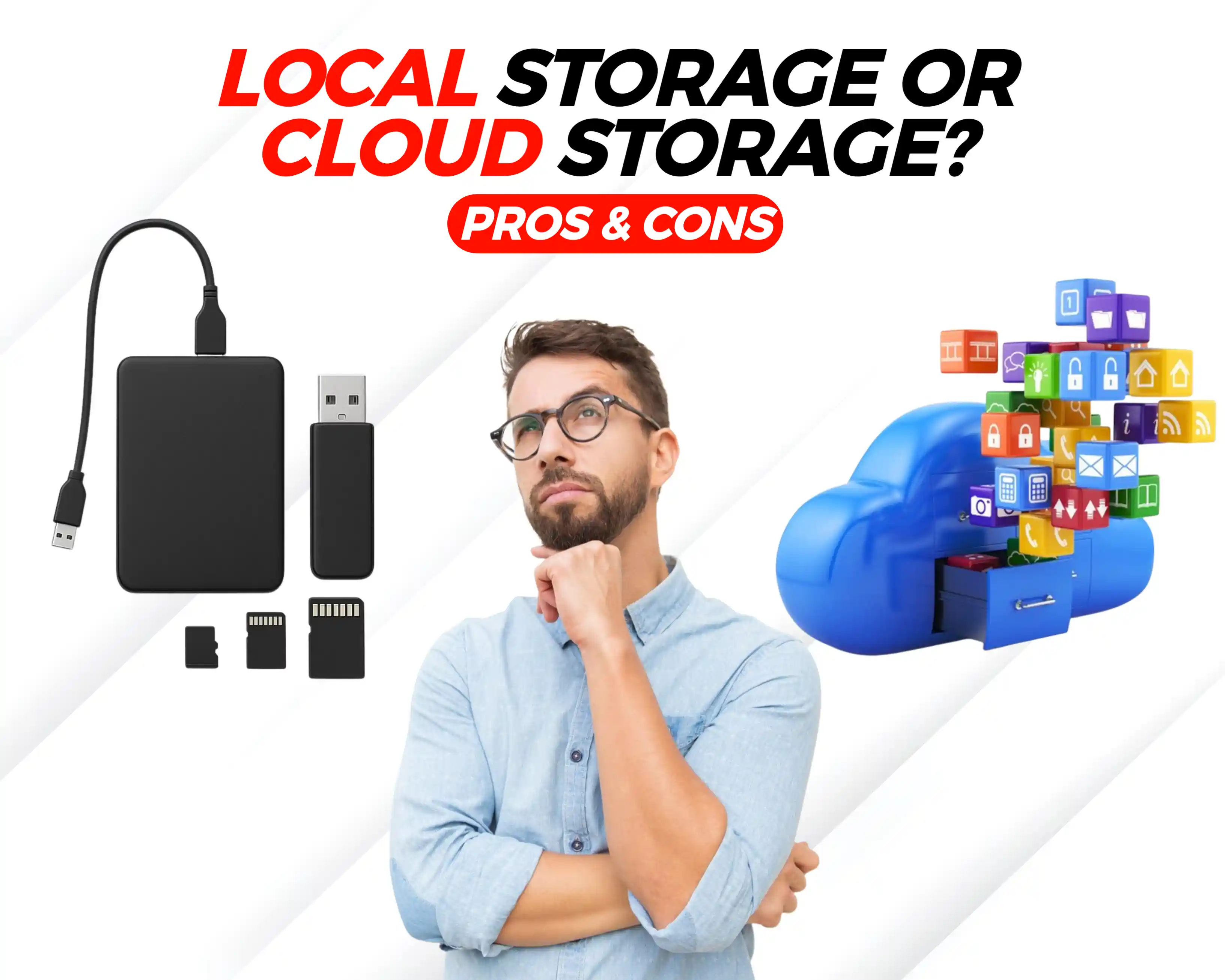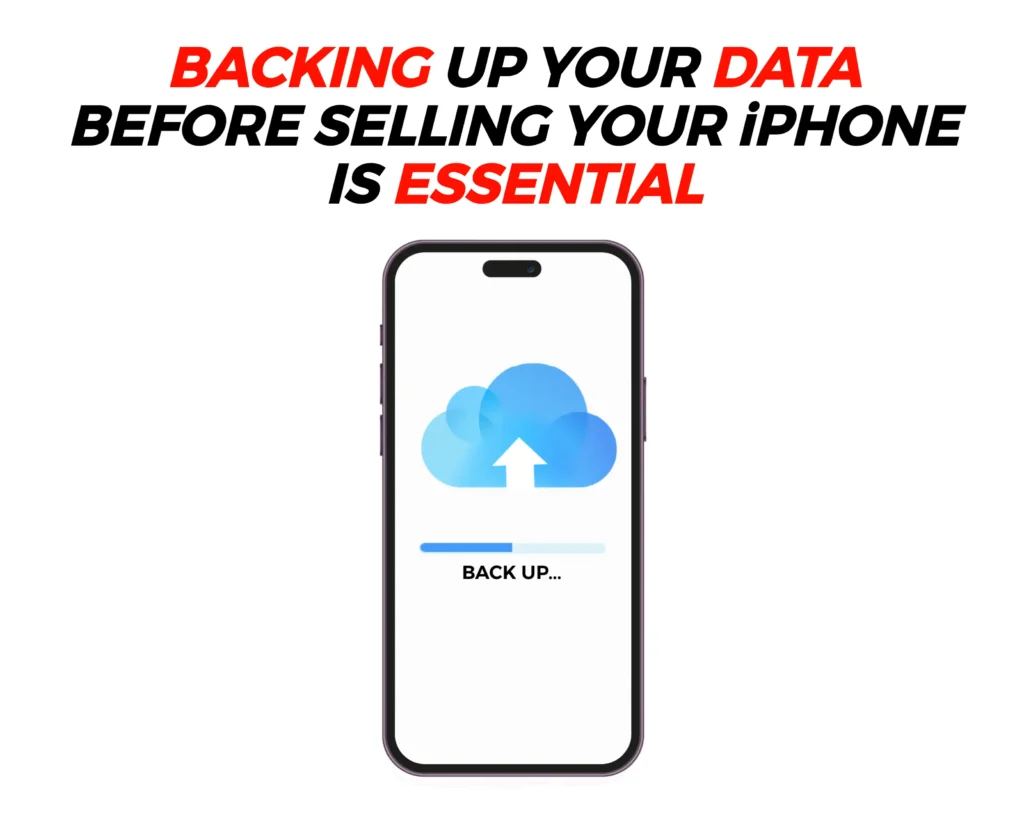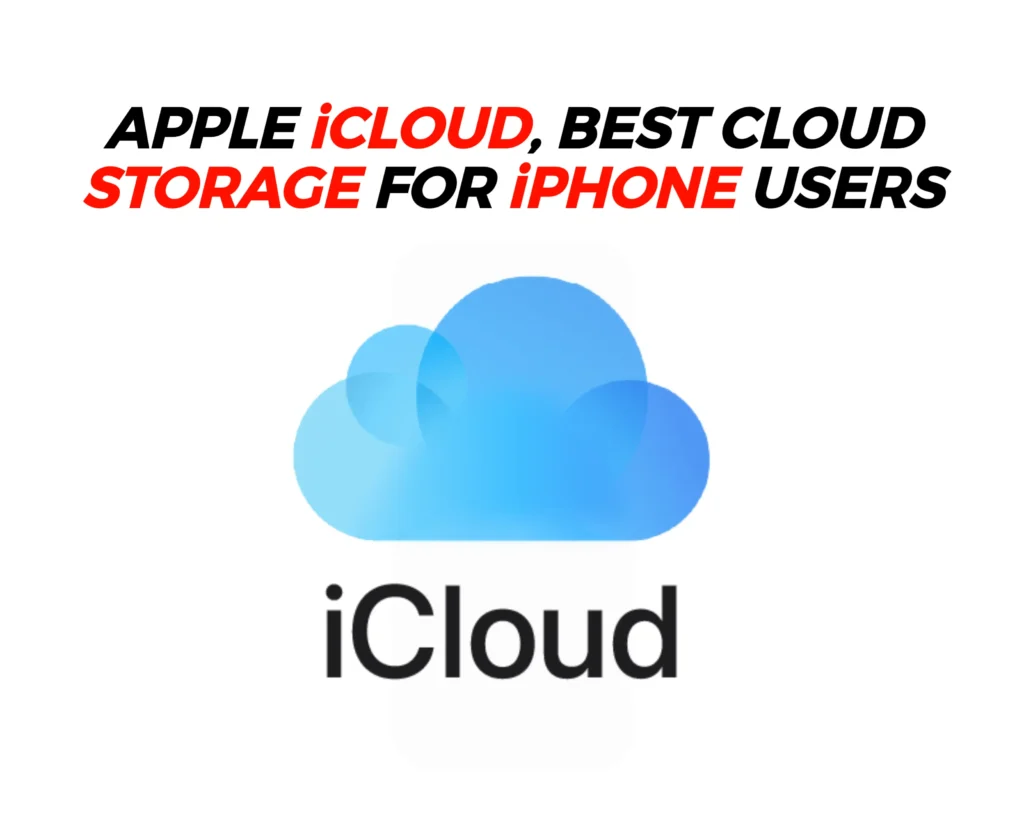
One of the most important things to do when selling your iPhone is backing up your data so you can transfer it to your new device. The question now is, where should you back up your data before selling your iPhone: Cloud storage vs Local storage?
In this article, we’ll look at cloud storage vs local storage to help you determine the best place to back up your data before selling your iPhone online. We’ll cover:
- What is cloud storage
- What is local storage
- Pros and cons of cloud and local storage when selling iPhone
- Key differences between cloud and local storage
- Which one should you choose?
- Best Cloud Storage Platforms for iPhone, etc.
What is Cloud Storage?
Cloud storage, in simple terms, is a method of storage where files are stored on remote servers and accessed through a network, usually the internet.
With cloud storage, you upload your data, like images, documents, videos, etc., to the cloud storage provider over the internet. Once the upload process is done, you can easily access the data from anywhere at any time and can download the data back to your device as long as you have an internet connection.
The rise of cloud storage removed a significant hurdle in moving to a new device; now, as long as you’re connected, you can easily access your data on the cloud without going through the hassle of transferring over every single file.
What is Local Storage?
As you probably already know, local storage simply means storing data locally on physical devices like hard drives, flash drives, etc. Understanding this helps users compare cloud vs. local storage and decide which works best before selling their device.
Even today, local storage is still a viable option for storing your data because, unlike cloud storage, which requires a periodical subscription fee for you to keep using their platform, you only need to buy a hard drive once, and it’s yours forever, and it doesn’t depend on a connection that can sometimes be unstable.

What’s Best for Backing Up Your iPhone Before You Sell: Pros & Cons
Let’s explore the cloud storage vs local storage pros and cons to see which option fits your needs.
Cloud Storage (iCloud, Google Drive, OneDrive, etc.)
Pros:
- Easy Transfer: Quickly sync your data to a new iPhone or device.
- Automatic Backup: Photos, contacts, and app data can be backed up without manual effort.
- Remote Access: Access your files anytime, even after selling your old phone.
- Space-Saving: No need to carry extra hardware; everything is online.
- Peace of Mind: Reduces the risk of losing files before you sell your iPhone online.
Cons:
- Internet Required: Uploads and restores require stable internet, which can be slow for large files.
- Cost: Free storage is limited; upgrading to more space may require a subscription.
- Privacy Concerns: Data is stored on someone else’s servers—potential risk if account security is weak.
- Dependent on Accounts: You must log out completely before selling; otherwise, your data may remain on the phone.
Local Storage (Computer, External Drive, USB, etc.)
Pros:
- Full Control: All data is physically in your hands; no third-party access.
- Offline Backup: Works without internet. Ideal for large photo/video libraries.
- One-Time Cost: No recurring subscription required for storage hardware.
- Security: Harder for hackers to access if properly stored.
Cons:
- Physical Risk: Drives can fail, get lost, or be damaged.
- Manual Process: Backing up and restoring files requires more effort.
- Limited Accessibility: Files aren’t instantly available across multiple devices like cloud storage.
- Potential Compatibility Issues: Large backups may need formatting or special software to restore fully on a new device.
While cloud storage offers convenience, local storage has its own advantages. Comparing cloud storage vs. local storage pros and cons can help you choose wisely.
Key Differences Between Cloud and Local Storage When Selling iPhone
| Feature | Cloud Storage (e.g. iCloud) | Local Storage (e.g. External Drive/Computer) |
| Ease of Transfer | Very Convenient: You can restore your data to a new phone wirelessly from anywhere with a Wi-Fi connection during setup. | Requires Hardware: You must connect the new phone to a computer with a cable to restore the backup from Finder or iTunes. |
| Data Safety (Post-Wipe) | Excellent. Once your data is confirmed in the cloud, you can confidently erase your old iPhone knowing nothing personal is left behind. | Excellent. After backing up to your computer or external drive, you can safely wipe the old device. The data is completely separate. |
| Cost Factor | Ongoing Subscription: You must continue paying a monthly or annual fee to maintain your storage space. If payments stop, your data could be deleted after a grace period. | One-Time Purchase: You pay once for an external drive or use your computer’s existing storage. There are no recurring costs. |
| Accessibility | Backups can be restored quickly and easily as long as you have a good internet connection. | You need physical access to the specific computer or external drive where the backup is saved. |
| Peace of Mind | Your files are securely stored off-site, safe from local damage or theft of your personal hardware. | You have complete physical control over your personal data, which can be comforting for privacy-focused individuals. |
Which One Should You Choose Before Selling Your iPhone?
Cloud storage
If you want a hassle-free, readily available, and accessible option, then cloud storage is the best for you. Although its speed is dependent on how fast your internet is.
Local storage
Local storage is best if you don’t want to be stuck paying subscription fees endlessly, are a privacy-oriented person, or if where you live simply doesn’t offer fast enough or reliable internet.
Hybrid approach
The hybrid approach is a smart combination of both local and cloud storage. For example, you can use the cloud for everyday files like work documents, then store data you don’t use much or large bulk files like videos/photos on a local drive.
Choosing the right backup method ensures you can safely sell your iPhone online without risking data loss.
Best Cloud Storage Platforms for iPhone
Apple iCloud

Apple’s very own iCloud is undoubtedly the best cloud storage option for iPhone users. It ties seamlessly into every part of the Apple ecosystem, making moving files after switching easier, and it syncs across all your Apple devices and services like Photos, productivity apps, Mail, Calendar, etc.
Selling your iPhone to get an Android? Don’t worry, you can use Apple’s suite of web apps to access your files on iCloud.
iCloud Pricing
- 5 GB free
- 50 GB for $0.99
- 200 GB for $2.99
- 2 TB for $9.99
If you’re indeed making the switch to Android, then this cloud storage service is an excellent iCloud alternative.
Google Drive
Drive is Google’s own cloud storage service that works quite seamlessly across all available platforms as long as you have a Gmail account.
Apart from being a good option for iPhone users switching over to Android, Drive is also an excellent iCloud alternative, even if you’re staying in the Apple ecosystem. It works well across Apple devices and comes with 15 GB of free cloud storage.
Google Drive Pricing
- 15 GB free
- 100 GB for $1.99
- 200 GB for $2.99
- 2 TB for $9.99
Practical Tips for Sellers
- Always back up before a factory reset before you sell your iPhone online.
- Double-check your cloud account is signed out before trying to sell your iPhone.
- For local backups, test that your files open correctly.
- Consider moving sensitive files to a local-only drive for extra privacy.
Conclusion
Both cloud and local storage have unique benefits. Cloud storage offers convenience and accessibility, while local storage provides control and privacy.
Whether you choose cloud, local, or a hybrid strategy, knowing the cloud storage vs. local storage pros and cons will help protect your data and make your phone sale stress-free.
Before you sell or trade in your device, make sure your data is safe. Back up wisely, and enjoy a worry-free transition to your new device.
Don’t let your old iPhone lose value. Sell it at TheWhizCells.com now, the best place to get the most cash for your old iPhone!
Frequently Asked Questions on Cloud vs. Local Storage for Backing Up Data When Selling iPhone Online.
What is the difference between iPhone storage and cloud storage?
iPhone storage refers to the built-in physical memory on your device where apps, photos, and files are saved directly. Cloud storage, on the other hand, is online storage provided by services like iCloud, Google Drive, or OneDrive, where your data is stored on remote servers and accessed over the internet. Simply put, iPhone storage is local and physical, while cloud storage is remote and virtual.
Is cloud storage better than local storage?
It depends on your needs. Cloud storage is better for convenience, easy access across multiple devices, and automatic backups. Local storage is better for privacy, complete control, and offline access. Many users prefer a hybrid approach, using the cloud for everyday data and local storage for large or sensitive files.
Which storage is best for iPhone?
The best storage depends on your priorities:
- Cloud storage (iCloud) is ideal for seamless backups, easy transfers to a new iPhone, and access anywhere.
- Local storage is ideal if you want offline backups, maximum control, and no recurring subscription costs.
- A hybrid approach, with cloud for essential files and local storage for larger backups, often works best.
Does buying iCloud storage give you more iPhone storage?
Not exactly. Buying iCloud storage does not increase your iPhone’s built-in storage capacity. It simply gives you more online storage space to back up and sync your files, freeing up room on your iPhone but not physically expanding its memory.
Where to sell iPhone for the most money?
If your goal is to maximize your payout, specialized buyback sites like The Whiz Cells usually pay more than carriers or general marketplaces. Selling your device online through such platforms ensures you sell iPhone online safely while getting top value.
Who pays for old iPhones?
Many platforms accept old iPhones, including Apple trade-in, carriers, and online marketplaces. If you want guaranteed payment and a fast process, and have been thinking, “How do I sell my iPhone online fast?” then sell your iPhone to The Whiz Cells.
